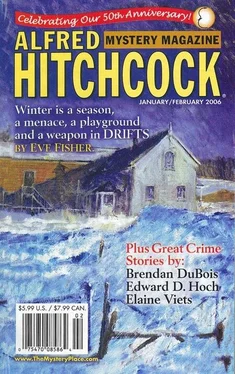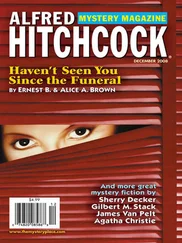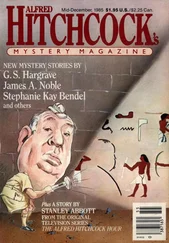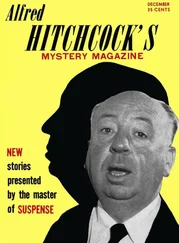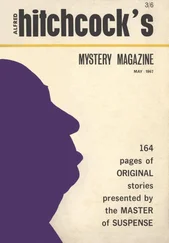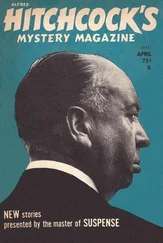John Betancourt - Alfred Hitchcock’s Mystery Magazine. Vol. 51, No. 1 & 2, January/February 2006
Здесь есть возможность читать онлайн «John Betancourt - Alfred Hitchcock’s Mystery Magazine. Vol. 51, No. 1 & 2, January/February 2006» весь текст электронной книги совершенно бесплатно (целиком полную версию без сокращений). В некоторых случаях можно слушать аудио, скачать через торрент в формате fb2 и присутствует краткое содержание. Город: New York, Год выпуска: 2006, Издательство: Dell Magazines/Crosstown Publications, Жанр: Детектив, на английском языке. Описание произведения, (предисловие) а так же отзывы посетителей доступны на портале библиотеки ЛибКат.
- Название:Alfred Hitchcock’s Mystery Magazine. Vol. 51, No. 1 & 2, January/February 2006
- Автор:
- Издательство:Dell Magazines/Crosstown Publications
- Жанр:
- Год:2006
- Город:New York
- ISBN:нет данных
- Рейтинг книги:4 / 5. Голосов: 1
-
Избранное:Добавить в избранное
- Отзывы:
-
Ваша оценка:
- 80
- 1
- 2
- 3
- 4
- 5
Alfred Hitchcock’s Mystery Magazine. Vol. 51, No. 1 & 2, January/February 2006: краткое содержание, описание и аннотация
Предлагаем к чтению аннотацию, описание, краткое содержание или предисловие (зависит от того, что написал сам автор книги «Alfred Hitchcock’s Mystery Magazine. Vol. 51, No. 1 & 2, January/February 2006»). Если вы не нашли необходимую информацию о книге — напишите в комментариях, мы постараемся отыскать её.
Alfred Hitchcock’s Mystery Magazine. Vol. 51, No. 1 & 2, January/February 2006 — читать онлайн бесплатно полную книгу (весь текст) целиком
Ниже представлен текст книги, разбитый по страницам. Система сохранения места последней прочитанной страницы, позволяет с удобством читать онлайн бесплатно книгу «Alfred Hitchcock’s Mystery Magazine. Vol. 51, No. 1 & 2, January/February 2006», без необходимости каждый раз заново искать на чём Вы остановились. Поставьте закладку, и сможете в любой момент перейти на страницу, на которой закончили чтение.
Интервал:
Закладка:
“What?”
“There are no snakes in the Azores at all.”
Drifts
by Eve Fisher
I stepped out of the car and the snow whirled up around my boots, burying them. The door shielded my face, and I clung to it for a minute. I could change my mind. I could get back inside, start it up, turn the heater on, warm up a bit, have a cigarette. I stepped away, thinking it over, and the wind slammed the door shut for me. I turned around, and the snow whipped me in the face.
I knew where I was. The car was behind me, facing southwest on the ice-covered gravel road that led to Lake Howard. I could see the top branches of the cottonwoods by the shore. They were waving in the wind, perhaps cheering a game on the ice, or for me to come to them for shelter. Back the other way, northeast, was a paved road that someone might come down. Either way, it was damned cold, and I had to make a choice to get moving or get back in the car. The snow was already packing up against the tires. I was already shivering. I pulled my muffler as tight around my face as I could and started walking.
I know snow. Blizzards are a fact of life up here. They’re fun when you’re safe at home, drinking coffee, looking out the window, and knowing there’s no place you have to go, and even if there is, no one will expect you in this weather. You watch the snowdrifts pile up around the trees, around the cars, in that sinuous curve across the lawn that shows where the wind lines meet. When the first snow falls — usually in October — everybody hurries to get in their cars and try it out. Twenty winters and you still have to relearn how to drive in it. Every time, just when you think it’s easy, you hit the brakes wrong and fishtail.
Later, in November, with the geese gone and the fields stubbling up through white powder, driving is easy, even when it’s windy and the snow drifts across the road in a thin cloud. You have time to look along the sloughs, where the wind’s broken the thin ice, at the water, gunmetal blue with white-capped waves, and rising from each individual wave is a little plume, a little flourish, of white.
And the early mornings and late evenings, after the fields have been blanketed solid, and the snow and the sky are the exact same color, and the only thing that tells you which way is up is the blue-black ribbon of highway.
And then the wind picks up, blowing the snow across that ribbon and under the wheels, where it writhes and dances and curves, giving the dizzying feeling of driving on something tangibly alive.
And later still, in the heart of winter, the snow leaps up from the road, down from the sky, and catches you somewhere in the middle, and driving a car becomes an act of desperation. You can’t see, you can’t hear, you can’t speed up, and you sure as hell can’t stop because who knows whether you’re on the road or a drift or a field and who would ever find you? Who would ever find you?
I know snow. I’ve been out at fifteen below zero, with my hands like wood in my gloves, wood that aches, the cold crisping my legs and the snot running down my nose like a broken faucet. I’ve walked under trees so loaded with ice that they sound like glass when the wind blows, and walking among them is like walking under a forest of crystal swords. I’ve walked on top of ten foot snowdrifts, and broken through a deceptive crust down into a cold, wet, gray-pocked white grave and scrabbled my way out, wet and cold and aching.
I was cold and aching now. Inhale, the smell of wet wool; exhale, the warm wet of my breath. Inhale, the slap of my freezing muffler across my face; exhale, and it billows slightly away. Which is worse, the muffler scraping my face rawer and rawer, or the blizzard wind, which simply wants to freeze it all in one gust? The numb feet stumbling over hummocks too white to see, or the sharp twist in my back when I slip? The pounding in my chest, or the tightening of my neck? Is this the road, or did I drift to the field?
I stopped and tried to see. No blizzard simply blows hard in one direction; there are whirlpools and eddies and streams. It wraps the snow around you — follow the wind, and you’ll dance in a circle until you drop down dead, and then it will cover you, gently and firmly. The High Plains, my cousin Bill once said, prove that the land is an ocean of earth, and the ocean is the wind turned to water. He froze to death in the snow last year. Out with some friends of his, all of them tanked. The cops came, and the guy who was driving was underage and panicked. Hit Bill, didn’t even realize it. Forgot all about him. They found his body a few days later. Bill loved the winter, so maybe he died happy.
A lot of people die in the winter. The winter obituaries are full of the old: pneumonia, heart, stroke, and just wearing out. There are countless accidents: cars fishtail through intersections, flip, and land upside down on the freeway, slide off the road into the ditch, and break through the ice into frozen lakes. There’s slush and sleet and the long white patches of icy snow by the shelterbelts that never melt until spring. There’s black ice, which isn’t black at all, but clear and invisible as glass. In town, people slip and fall on icy patches of sidewalk, breaking their wrists, their arms, their legs, their heads.
Three men went out driving in a blizzard once. They were crazy, and had had too much to drink. They got stuck in a snowdrift, and they were too drunk to do anything about it except get in the back seat and huddle for warmth. They just sat there, drinking some more, and the car was covered in snow. When they were found, three days later, the two men on the outside had frozen to death. Only the man in the middle had survived.
I scraped at the snow beneath me with my heel. Gravel, so I was still on the road. My eyelashes were white with snow and rime, and blinking hurt. I went forward, hunched again against the wind, which promptly whipped around and nearly knocked me down from the back. The paved road should be coming up soon. It had better be soon. There was a knot deep in my belly that was sheer cold, and I knew if it got much larger it would kill me.
It was the deputy who’d found the body who told me the story about the three men in the car. He wondered why they hadn’t run up the radio antenna with a rag on it, to make it easier to find them. Personally — though I said nothing — I wondered if it had all been planned by the survivor. The perfect crime.
I finally reached the paved road. The snowplows hadn’t been through here yet and wouldn’t for a while — the lesser county roads come after the major county roads, which come after the state roads, which come after the interstate, and none of them get done while the wind is blowing. But there were tire tracks, so people had been out recently. I just had to decide which way to hike. I didn’t want to hike anywhere. I wanted to stop. I wanted to rest. I wanted to sit down for a minute, curl up, and... and then I would get so cold I’d be warm, and I’d sleep and sleep and sleep and never wake up again. Like those two men in the car. Like Bill.
I turned to the left — northwest. If a car came by in this weather, they’d stop and pick me up. If no more cars came by, there was bound to be a farmhouse up the road. They’d let me in. And if they weren’t in, their door would probably be unlocked. And even if it wasn’t, and I could figure a way to get in, no one would nail me for breaking and entering. Not in a blizzard. I was going to be okay. I just had to keep going.
Winter’s a dangerous thing to love. It’s pure and it’s gorgeous and it owns this land. It owns us. We sit in our houses with the heat turned up and think what a pretty day it is out there, with the sun gleaming on the snow or the snow dancing in the air. But a tree falls in the ice, and the power goes out, and we’re ice men again. We’re out on the road and we’re full of the power of our automobiles and at the same time we know one little slip, one little mistake in judgment or speed, or just the chance encounter with a pebble or a bird or a deer and there we are, with winter laughing all around us. You live up here, and it doesn’t take long to understand why crime rates drop like a stone come November. Winter takes the place of crime; winter takes the place of night; winter takes the place of the bogeyman and the mothman and the raptors and everything you’ve ever been afraid of. Winter rules everything, and if you don’t know that, you don’t know anything. And you will die.
Читать дальшеИнтервал:
Закладка:
Похожие книги на «Alfred Hitchcock’s Mystery Magazine. Vol. 51, No. 1 & 2, January/February 2006»
Представляем Вашему вниманию похожие книги на «Alfred Hitchcock’s Mystery Magazine. Vol. 51, No. 1 & 2, January/February 2006» списком для выбора. Мы отобрали схожую по названию и смыслу литературу в надежде предоставить читателям больше вариантов отыскать новые, интересные, ещё непрочитанные произведения.
Обсуждение, отзывы о книге «Alfred Hitchcock’s Mystery Magazine. Vol. 51, No. 1 & 2, January/February 2006» и просто собственные мнения читателей. Оставьте ваши комментарии, напишите, что Вы думаете о произведении, его смысле или главных героях. Укажите что конкретно понравилось, а что нет, и почему Вы так считаете.
